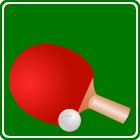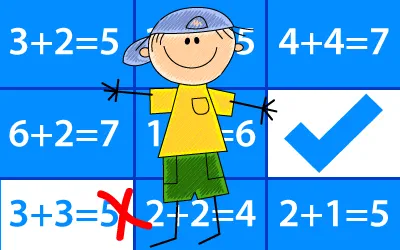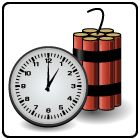


Game: FOUR IN A ROW
Aim: To get four symbols in a row
Method:
Choose a square and click on it. Click on the correct answer to the question in the box that appears. If you are right the square is replaced by a tick. Continue until you have won 4 in a row...

john shanburn 😪🤫☣️
"Which fraction is biggest"
4 IN A ROW game to practice
'Order fractions from smallest to largest' for 2nd grade
2nd grade / Fractions / Fractions and decimals / Order fractions from smallest to largest
Order fractions from smallest to largest
Knowing which fraction is biggest or smallest is not always obvious. If we compare fractions that have the same number on the bottom (the denominator) like ⅖, ⅗ and ⅘, then the bigger the number on the top (the numerator) the bigger the fraction is.
If we compare ⅘, ⅗ and ⅖, we can see that all those fractions have the same denominator of 5. The numerators are 4, 3 and 2. So we can say that to arrange those fractions in order from smallest to biggest will be :
⅖ ⅗ ⅘
Order unit fractions from smallest to largest
There is another type of fraction that we need to talk about, unit fractions.
A unit fraction is the name for a fraction where the number on the top is a 1.
So ½ is a unit fraction and so are ⅐ and ⅛ but ⅖ is not because it's numerator is not 1, it is 2.
Arranging unit fractions from smallest to biggest is not as easy as our first example. If we think about the two most common unit fractions, ¼ and ½, we will see why. Which is bigger, ¼ of a cake or ½ a cake? The answer is that ½ a cake is bigger than ¼ of a cake even though the denominator of ½, which is 2, is smaller than the denominator of ¼, which is 4.
So, when we are asked to arrange fractions which are unit fractions, we have to remember that we need to compare the denominators, but that the fractions with the biggest denominators are the smallest fractions. If we are asked to arrange ⅕ ⅙ ⅐ in order from smallest to largest, we compare the denominators and order the fractions with the bigger denominators first and those fractions with the smaller denominators last. Arranging ⅕ ⅙ ⅐ in order from smallest to largest gives :
⅐ ⅙ ⅕
With our Four in a row math game you will be practicing the topic "Order fractions from smallest to largest" from 2nd grade / Fractions / Fractions and decimals. The math in this game consists of 16 questions that ask you to re-arrange each set of fractions so that they are listed from smallest to largest.

The game will reinforce the math you have chosen to learn by getting you to match the question to the correct answer.
Notes
- Do the Math lessons for your topic before playing this game
- Wrong answers are ok, you just have to try again until you get them right
- There is help available for all games by clicking the question mark button
UXO * Duck shoot * The frog flies * Pong * Cat and mouse * The beetle and the bee
Rock fall * Four in a row * Sow grow * Choose or lose * Mix and match





How to play 4 in a row to practice
'Order fractions from smallest to largest' for 2nd grade

- Select "4 in a row" on the math games selection page.
- Take a quick look at the method text for 4 in a row.
- Click on PLAY to proceed, or change your topic with the CHANGE TOPIC button.
- On the play page you have a grid of 16 pictures (some topic picture are shown multiple times for shorter topics).
- Click on a picture cell.
- The topic question will appear along with a series of possible answers.
- Click the speaker icon to hear any particular answer (Speech enabled browsers only).
- Click the answer that corresponds to the picture question.
- If you are correct, the picture will be replaced by a tick - otherwise, a wrong sound will play.
- Continue matching picture questions to their correct answers until you have completed a line of 4 cells.
- The line can be diagonal as well as horizontal or vertical.
- 4 ticks in a row wins the game.
- Choose an option from the green sign, or click on games to choose a different game.











